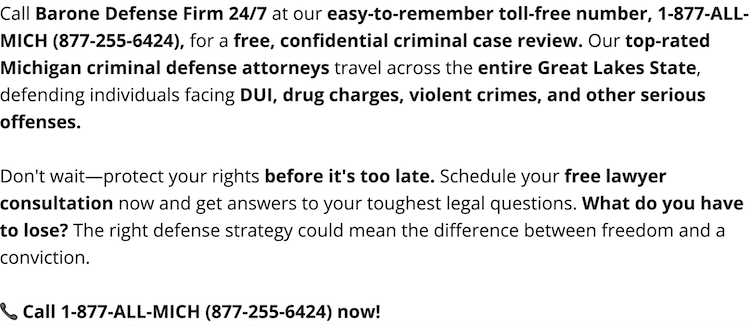People vs. M.W.
Court: Hopkins
Charge: OUIL
The Arresting Officer in this case testified that he responded to the scene of a property damage accident. When he arrived, another Officer advised him that they were looking for the driver in the nearby field. The suspect was later found in the field, laying face down. When approached, he stood up with keys to "the truck" in his hand. A very strong odor of intoxicants was noted, along with red, watery and glassy eyes. He also admitted to drinking three or four beers.
Field sobriety tests were administered, including the horizontal gaze nystagmus (HGN), walk-and-turn and one-leg stand. The suspect was unable to perform any of these to the satisfaction of the officer, and he was arrested for OUIL. He refused to submit to a breath test, and a warrant for blood was obtained. The Officer also testified that prior to asking the suspect to submit to the breath test, he read the Chemical Test Rights to the suspect from "the form", but did not further identify the form, other than to say it was "pink in color".
We argued that the Officer had failed to meet his burden of proof in that he had not established that the suspect was the driver of the vehicle (in legal jargon, that there was no "corpus delicti"), and therefore, that the arrest was unlawful. We also argued that the Officer had failed to meet his burden of proof relative to the Chemical Test Rights because he had not indicated specifically what the rights were, and because the "form" was not produced or properly identified, there was no evidence on the record that the implied consent statute had been satisfied.
The Hearing Officer issued a written opinion indicating that our appeal was granted. The opinion indicates "[A]s counsel for the petitioner noted at the hearing the form provided to the police to read the Chemical Test Rights from is not called a "DI177" as the officer testified to at this hearing. Without something in the record to establish with some specificity what Chemical Test Rights the officer advised the petitioner (sic) of I can not find that the petitioner was properly advised of the Chemical Test Rights request by statute".
Because the Petitioner's appeal was granted his operating privileges were not suspended for six months based on the alleged refusal to submit to a chemical test.
 Barone Defense Firm Home
Barone Defense Firm Home




















